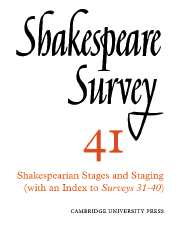Book contents
- Frontmatter
- The Shakespearian Stages, Forty Years On
- The Original Staging of The First Part of the Contention (1594)
- Charles Calvert’s Henry V
- Hamlet, An Apology for Actors, and The Sign of the Globe
- ‘Hid indeed within the centre’: The Hall/Finney Hamlet
- Malvolio and the Dark House
- The Text of Cressida and Every Ticklish Reader: Troilus and Cressida, The Greek Camp Scene
- Antony and Cleopatra, Act 4 Scene 16: ‘A Heavy Sight’
- The Tempest’s Tempest at Blackfriars
- Keats and Lucrece
- The Resources of Characterization in Othello
- Ovid and the Mature Tragedies: Metamorphosis in Othello and King Lear
- The Passing of King Lear
- Shakespeare Performances in London and Stratford-upon-Avon, 1986–7
- Professional Shakespeare Productions in the British Isles, January–December 1986
- The Year's Contributions to Shakespeare Studies: 1 Critical Studies
- 2 Shakespeare’s Life, Times, and Stage
- 3 Editions and Textual Studies
- Books Received
- Index to Volume 41
- General Index to Volumes 31-40
The Tempest’s Tempest at Blackfriars
Published online by Cambridge University Press: 28 March 2007
- Frontmatter
- The Shakespearian Stages, Forty Years On
- The Original Staging of The First Part of the Contention (1594)
- Charles Calvert’s Henry V
- Hamlet, An Apology for Actors, and The Sign of the Globe
- ‘Hid indeed within the centre’: The Hall/Finney Hamlet
- Malvolio and the Dark House
- The Text of Cressida and Every Ticklish Reader: Troilus and Cressida, The Greek Camp Scene
- Antony and Cleopatra, Act 4 Scene 16: ‘A Heavy Sight’
- The Tempest’s Tempest at Blackfriars
- Keats and Lucrece
- The Resources of Characterization in Othello
- Ovid and the Mature Tragedies: Metamorphosis in Othello and King Lear
- The Passing of King Lear
- Shakespeare Performances in London and Stratford-upon-Avon, 1986–7
- Professional Shakespeare Productions in the British Isles, January–December 1986
- The Year's Contributions to Shakespeare Studies: 1 Critical Studies
- 2 Shakespeare’s Life, Times, and Stage
- 3 Editions and Textual Studies
- Books Received
- Index to Volume 41
- General Index to Volumes 31-40
Summary
At one fairly inconspicuous moment in Heywood's play 1 The Fair Maid of the West, the Chorus to Act 5, the Chorus says, of a shipwreck scene,
Our stage so lamely can express a sea
That we are forc'd by Chorus to discourse
What should have been in action.
(4.5.1-3)The Fair Maid was moderately well known even before Heywood wrote a sequel for the Cockpit company who played it at Court in the early 1630s, when the two plays were first published.2 It was probably originally written in 1609-10, because The Roaring Girl refers to it, and that play can be dated precisely in 1611. The dating, very close to the time The Tempest was written, raises the question whether Shakespeare heard Heywood's lament before he wrote the shipwreck scene to open his play, or alternatively whether Heywood's Chorus was commenting on the failure of The Tempest's shipwreck scene. Either Shakespeare was showing Heywood what a different playhouse could do on its not-so-lame stage, or Heywood was disowning Shakespeare's failure.
Another play of Heywood's, written rather earlier, The Four Prentices of London, has a broadly similar display of modesty, this time prescribing exactly what he would have liked his stage to show.
- Type
- Chapter
- Information
- Shakespeare Survey , pp. 91 - 102Publisher: Cambridge University PressPrint publication year: 1989
- 10
- Cited by

